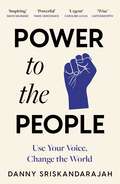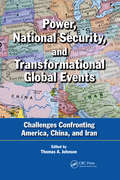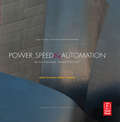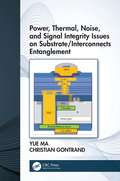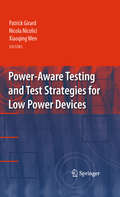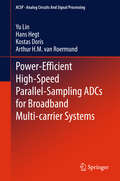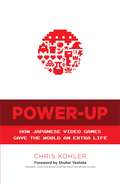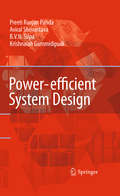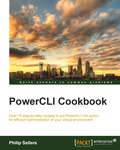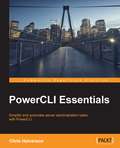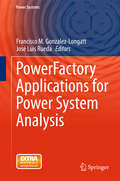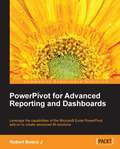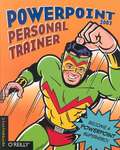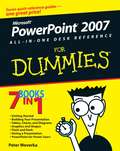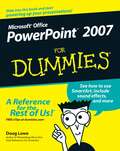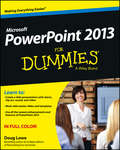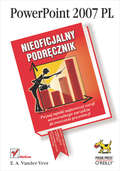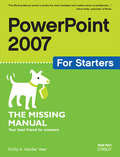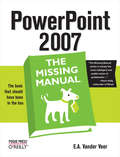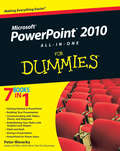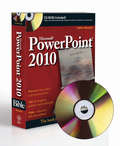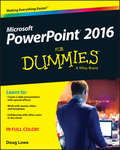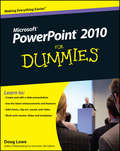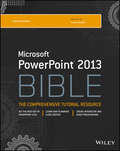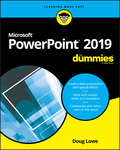- Table View
- List View
Power to the People: Use your voice, change the world
by Danny SriskandarajahDanny Sriskandarajah learned the value of citizenship at a young age as the child of Tamil migrants who moved from Sri Lanka to Australia. Arriving in the UK as the first Rhodes scholar from an Asian immigrant background, he has gone on to run a series of civil society organisations, and has become a leading voice in the third sector.POWER TO THE PEOPLE is his radical manifesto for change designed to inspire citizen action around the world. The book presents a blueprint for how we, as individuals, can make a difference through greater community engagement, and how we can deliver a society that works for the many and not the few. He speaks to voter apathy and a growing sense that elections no longer matter, with politicians and institutions too focused on short-term issues to grapple with complex global problems such as climate change, rising inequality, and digital disruption. Yet the book is also filled with inspiring real-life examples of citizen power in action, ranging from a volunteer-run repair café in Danny's local suburb to Avaaz's successful campaigns to tackle endemic corruption in Brazil.From public ownership of social media spaces to democratising share ownership, and from re-energising co-operatives to creating a people's chamber at the United Nations, this campaigning book has a clear mission to make us reclaim our power as citizens of the world.
Power, National Security, and Transformational Global Events: Challenges Confronting America, China, and Iran
by Thomas A. JohnsonAs the United States struggled to survive the recent recession, China quietly acquired a vast amount of U.S. Treasury bills and bonds. With China now holding so much of America‘s debt, currency valuation issues have already caused tensions between the two superpowers. Couple this with Iran‘s efforts to develop into a nuclear power in an area that l
Power, Speed & Automation with Adobe Photoshop: (The Digital Imaging Masters Series) (The\digital Imaging Masters Ser.)
by Geoff Scott Jeffrey TranberryThis is a must for the serious Photoshop user! Power, Speed & Automation explores how to customize and automate Photoshop to increase your speed and productivity. With numerous step-by-step instructions, the authors-two of Adobe's own software developers!- walk you through the steps to best tailor Photoshop's interface to your personal workflow; write and apply Actions; and use batching and scripts to process large numbers of images quickly and automatically. You will learn how to build your own dialogs and panels to improve your production workflows in Photoshop, the secrets of changing keyboard shortcuts and menus, and ways to tune your system for optimal performance. Writing new processes using JavaScript is also covered, as well as leveraging Variables with data sets. Learn how to get more work done? more easily and quickly? with this essential guide! *This book can be used with any version of Photoshop through CS6!*
Power, Thermal, Noise, and Signal Integrity Issues on Substrate/Interconnects Entanglement
by Yue Ma Christian GontrandAs demand for on-chip functionalities and requirements for low power operation continue to increase as a result of the emergence in mobile, wearable and internet-of-things (IoT) products, 3D/2.5D have been identified as an inevitable path moving forward. As circuits become more and more complex, especially three-dimensional ones, new insights have to be developed in many domains, including electrical, thermal, noise, interconnects, and parasites. It is the entanglement of such domains that begins the very key challenge as we enter in 3D nano-electronics. This book aims to develop this new paradigm, going to a synthesis beginning between many technical aspects.
Power-Aware Testing and Test Strategies for Low Power Devices
by Xiaoqing Wen Nicola Nicolici Patrick GirardManaging the power consumption of circuits and systems is now considered one of the most important challenges for the semiconductor industry. Elaborate power management strategies, such as dynamic voltage scaling, clock gating or power gating techniques, are used today to control the power dissipation during functional operation. The usage of these strategies has various implications on manufacturing test, and power-aware test is therefore increasingly becoming a major consideration during design-for-test and test preparation for low power devices. This book explores existing solutions for power-aware test and design-for-test of conventional circuits and systems, and surveys test strategies and EDA solutions for testing low power devices.
Power-Efficient High-Speed Parallel-Sampling ADCs for Broadband Multi-carrier Systems
by Hans Hegt Yu Lin Kostas Doris Arthur H. M. RoermundThis book addresses the challenges of designing high performance analog-to-digital converters (ADCs) based on the "smart data converters" concept, which implies context awareness, on-chip intelligence and adaptation. Readers will learn to exploit various information either a-priori or a-posteriori (obtained from devices, signals, applications or the ambient situations, etc. ) for circuit and architecture optimization during the design phase or adaptation during operation, to enhance data converters performance, flexibility, robustness and power-efficiency. The authors focus on exploiting the a-priori knowledge of the system/application to develop enhancement techniques for ADCs, with particular emphasis on improving the power efficiency of high-speed and high-resolution ADCs for broadband multi-carrier systems.
Power-Up: How Japanese Video Games Gave the World an Extra Life
by Chris Kohler Shuhei Yoshida"Chris Kohler brings the passionate intensity of a hardcore fan to his writing, but he also has the background knowledge and the critical facilities to explore video games as an industry, as a medium, and as a cultural phenomenon." -- Wired.Why are Japanese video games a worldwide sensation? This enjoyable and informative survey explores the reasons, starting with how Japanese developers raised the medium to an art form. The book also traces the ways in which the developers' ideas infused popular culture beyond the gaming world.Interviews, anecdotes, and personal accounts offer insights from giants of the industry, including Shigeru Miyamoto, Hideo Kojima, and others involved in the creation of Donkey Kong, Mario, Pokémon, and other games. This revised edition includes updated material throughout the book as well as a new bonus chapter."While it appears that Japanese gaming is on the wane today, it's worth your time to read about an era when nothing could be further from the truth." -- IGN"Quite excellent... a great read." -- Hardcore Gaming 101"Direct and insightful ... I believe that it belongs on the top shelf of any collector." -- Steve Kent, author of The Ultimate History of Video Games
Power-efficient System Design
by Preeti Ranjan Panda Krishnaiah Gummidipudi B. V. Silpa Aviral ShrivastavaThis book addresses power optimization in modern electronic and computer systems. Several forces aligned in the past decade to drive contemporary computing in the direction of low power and energy-awareness: the mobile revolution took the world by storm; power budgets forced mainstream processor designers to abandon the quest for higher clock frequency; and large data centers with overwhelming power costs began to play vital roles in our daily lives. Power optimization was elevated to a first class design concern, forcing everyone from the process engineer, circuit designer, processor architect, software developer, system builder, and even data center maintainer to make conscious efforts to reduce power consumption using myriad techniques and tools. This book explores power optimization opportunities and their exploitation at various levels of abstraction. Fundamental power optimizations are covered at each level of abstraction, concluding in a case study illustrating the application of the major techniques to a graphics processor. This book covers a comprehensive range of disparate power optimizations and is designed to be accessible to students, researchers, and practitioners alike.
PowerCLI Cookbook
by Philip SellersIf you are a virtualization professional who wants to unleash the power of automation and combat the complexity of sprawling virtual environments, this book is ideal for you. This book will enhance your skills of administering VMware vSphere and vCloud Director with PowerCLI.
PowerCLI Essentials
by Chris HalversonSimplify and automate server administration tasks with PowerCLI About This Book * Automate VMware's VSphere environment by learning the essentials of PowerCLI * Impress your peers by developing scripts to perform administration tasks * Discover the intricate workings of PowerCLI through simple and real-life examples Who This Book Is For PowerCLI Essentials is focused toward virtualization professionals and system administrators who want to discover and learn about the automation techniques associated with PowerCLI for complex virtual environments. What You Will Learn * Download and install PowerCLI and its basics as well as the basics of PowerShell * Enchance your scritping experience * Build longer scripts and simpler reports * Relate a task in VMware administration to a PowerCLI script * Discover methods to acquire and change information remotely * Set up orchestrator to manage your workflow In Detail Have you ever wished you could automatically get a report with all the relevant information about your VMware environments in exactly the format you want? Or that you could automate a crucial task that needs to be performed on a regular basis? Powerful Command Line Interface (PowerCLI) scripts do all these things and much more for VMware environments. PowerCLI is a command-line interface tool used to automate VMware vSphere environments. It is used to handle complicated administration tasks through use of various cmdlets and scripts, which are designed to handle certain aspects of VSphere servers and to help you manage them. This book will show you the intricacies of PowerCLI through real-life examples so that you can discover the art of PowerCLI scripting. At the start, you will be taught to download and install PowerCLI and will learn about the different versions of it. Moving further, you will be introduced to the GUI of PowerCLI and will find out how to develop single line scripts to duplicate running tasks, produce simple reports, and simplify administration. Next, you will learn about the methods available to get information remotely. Towards the end, you will be taught to set up orchestrator and build workflows in PowerShell with update manager and SRM scripts. Style and approach Each and every topic in this book is explained in a very easy-to-follow fashion with real-life, simple examples so you'll get an idea not only about working with PowerCLI, but will also get an idea about scripting.
PowerFactory Applications for Power System Analysis
by Francisco M. Gonzalez-Longatt José Luis RuedaThis book presents a comprehensive set of guidelines and applications of DIgSILENT PowerFactory, an advanced power system simulation software package, for different types of power systems studies. Written by specialists in the field, it combines expertise and years of experience in the use of DIgSILENT PowerFactory with a deep understanding of power systems analysis. These complementary approaches therefore provide a fresh perspective on how to model, simulate and analyse power systems. It presents methodological approaches for modelling of system components, including both classical and non-conventional devices used in generation, transmission and distribution systems, discussing relevant assumptions and implications on performance assessment. This background is complemented with several guidelines for advanced use of DSL and DPL languages as well as for interfacing with other software packages, which is of great value for creating and performing different types of steady-state and dynamic performance simulation analysis. All employed test case studies are provided as supporting material to the reader to ease recreation of all examples presented in the book as well as to facilitate their use in other cases related to planning and operation studies. Providing an invaluable resource for the formal instruction of power system undergraduate/postgraduate students, this book is also a useful reference for engineers working in power system operation and planning.
PowerPivot for Advanced Reporting and Dashboards
by Robert Bosco JA step-by-step tutorial with focused examples that builds progressively from basic to advanced topics and helps you create business intelligence reports and dashboards quickly and efficiently using the PowerPivot add-in.This book is ideal for data analysts, reporting and MIS professionals, business analysts, managers, dashboard makers, business intelligence professionals, self-service business intelligence personnel, and students. It is assumed that you have basic data analysis skills and intermediate level Excel skills. Familiarity with Pivot Tables as well as basic knowledge of VBA scripting and SharePoint will be useful but not necessary.
PowerPoint 2003 Personal Trainer
by Customguide IncPowerPoint is the world's most widely used presentation program, a favorite of educators, trainers, and, of course, those in business everywhere. Yet, every time Microsoft releases a new version of the program, they introduce another set of features---most of which you'll never understand or use. Even if you have experience with PowerPoint, you'll struggle to keep up with the improvements. If you're a beginner, you probably don't know where to start. Now, with PowerPoint 2003 Personal Trainer , beginners and experts alike can become black belts with this presentation program, quickly and easily. This fully illustrated book takes a modular approach to learning, allowing you to start with the fundamentals and work your way to advance topics through dozens of task-oriented lessons--at your own pace. The companion CD tutorial guides you through each lesson interactively. PowerPoint 2003 Personal Trainer includes sections on editing, formatting, drawing, working with word art, tables, organization charts, multimedia, other programs, the Internet, and how to optimize presentation delivery. Every chapter includes detailed diagrams and a review at the end to help you absorb and retain all you have learned. If you already use PowerPoint, you can dive right into those topics (and only those topics) that you need or want to learn. Unlike many consumer software tutorials that dumb down the material or present it in a confusing fashion, PowerPoint 2003 Personal Trainer is written in a non-technical and engaging style that you will find fun, easy, and most of all, clear and informative. You don't have to wade through tons of jargon and technical information to become proficient. Part of our new Personal Trainer Series, this book is based on content from CustomGuide ( http://www.customguide.com ), a leading provider of computer training materials. Founded by instructors who grew dissatisfied with the industry's dry course materials, CustomGuide offers courseware (for instructors and students), quick references, to software bulletins and e-learning courses that are fun, flexible, and easy to use.
PowerPoint 2007 All-in-One Desk Reference For Dummies
by Peter Weverka7 books in 1--your key to PowerPoint success!Your one-stop guide to perfect presentations with PowerPoint 2007Everybody uses PowerPoint, right? How can you make your presentations pop? Check this handy reference with its easy-to-use minibooks! Once you get going with all the cool new stuff in PowerPoint 2007, you find out how to jazz up your presentations with charts, transitions, photos, animation, and even some ultra-cool power-user tricks.Discover how toPlan and create a presentationUse speed techniquesHandle master slides and master stylesCustomize slides with themes and templatesMake diagrams and chartsCreate video slides
PowerPoint 2007 For Dummies
by Doug LoweNew and inexperienced PowerPoint users will discover how to use the latest enhancements to PowerPoint 2007 quickly and efficiently so that they can produce unique and informative presentations PowerPoint continues to be the world's most popular presentation software This updated For Dummies guide shows users different ways to create powerful and effective slideshow presentations that incorporate data from other applications in the form of charts, clip art, sound, and video Shares the key features of PowerPoint 2007 including creating and editing slides, working with hyperlinks and action buttons, and preparing presentations for the Web
PowerPoint 2007 For Dummies
by LoweNew and inexperienced PowerPoint users will discover how to use the latest enhancements to PowerPoint 2007 quickly and efficiently so that they can produce unique and informative presentationsPowerPoint continues to be the world's most popular presentation softwareThis updated For Dummies guide shows users different ways to create powerful and effective slideshow presentations that incorporate data from other applications in the form of charts, clip art, sound, and videoShares the key features of PowerPoint 2007 including creating and editing slides, working with hyperlinks and action buttons, and preparing presentations for the Web
PowerPoint 2007 PL. Nieoficjalny podr?cznik
by E. A. Vander VeerPoznaj tajniki najnowszej wersji uniwersalnego narz?dzia do tworzenia prezentacji Tworzenie i formatowanie prezentacji Dodawanie elementów interaktywnych Dostosowywanie PowerPointa do w?asnych potrzeb Chcesz przedstawi? ofert? swojej firmy w interesujšcy sposób i wywrze? niezapomniane wra?enie na odbiorcach? Korzystasz z poprzednich wersji PowerPointa i chcesz sprawdzi?, czy warto u?ywa? jego najnowszej edycji? A mo?e chcesz pozna? takie mo?liwo?ci aplikacji, o których nie napisano w dokumentacji? PowerPoint to jeden z najpopularniejszych i najcz??ciej u?ywanych programów biurowych. Wed?ug statystyk jego u?ytkownicy tworzš codziennie ponad 30 milionów slajdów! Jego najnowsza wersja, oznaczona symbolem 2007, ró?ni si? znacznie od swoich poprzedniczek. Ma ca?kowicie przeprojektowany, nowatorski interfejs u?ytkownika i wiele nowych, ciekawych mo?liwo?ci. Umiej?tno?? tworzenia profesjonalnych prezentacji za pomocš PowerPointa jest bardzo mile widziana przez pracodawców, warto zatem dobrze pozna? ten program! "PowerPoint 2007 PL. Nieoficjalny podr?cznik" to omówienie mo?liwo?ci najnowszej wersji tej aplikacji. Znajdziesz tu nie tylko opis narz?dzi i funkcji, ale tak?e bezcenne porady, dzi?ki którym optymalnie wykorzystasz program i szybko rozwiš?esz wszelkie problemy. Czytajšc t? ksiš?k?, nauczysz si? efektywnie korzysta? z nowego interfejsu u?ytkownika, stworzysz profesjonalne slajdy i sformatujesz znajdujšce si? na nich elementy tekstowe i graficzne. Dowiesz si?, jak podnie?? atrakcyjno?? prezentacji, umieszczajšc w niej komponenty interaktywne i multimedialne, wykresy oraz arkusze kalkulacyjne. Poznasz sposoby odtwarzania prezentacji, dystrybuowania jej i drukowania materia?ów pomocniczych, które przed pokazem rozdasz jego uczestnikom. Przeglšd nowego interfejsu u?ytkownika Tworzenie nowej prezentacji na bazie ju? istniejšcej bšd? szablonu Definiowanie t?a slajdów Nawigowanie pomi?dzy slajdami podczas edycji Edycja i formatowanie elementów tekstowych Wstawianie grafiki, wykresów, diagramów i tabel Odtwarzanie prezentacji Drukowanie slajdów i materia?ów informacyjnych Rysowanie na slajdach Wstawianie przej?? pomi?dzy slajdami Dostosowywanie PowerPointa do w?asnych potrzeb Praca grupowa Naucz si? tworzy? prezentacje, dzi?ki którym przekonasz audytorium do swoich idei.
PowerPoint 2007 for Starters: The Missing Manual
by E. A. Vander VeerFast-paced and easy to read, this new book teaches you the basics of PowerPoint 2007 so you can start using the program right away. This concise guide shows readers how to work with PowerPoint's most useful features and its completely redesigned interface. With clear explanations, step-by-step instructions, lots of illustrations, and plenty of timesaving advice, PowerPoint 2007 for Starters: The Missing Manual will quickly teach you to:Create, save, set up, run, and print a basic bullets-and-background slideshow Learn how to add pictures, sound, video, animated effects, and controls (buttons and links) to your slides Discover how to incorporate text, spreadsheets, and animations created in other programs The new PowerPoint is radically different from previous versions. Over the past decade, PowerPoint has grown in complexity, but its once-simple toolbar has been packed with so many features that not even the pros could find them all. For PowerPoint 2007, Microsoft redesigned the user interface completely, adding a tabbed toolbar that makes every feature easy to locate.Unfortunately, Microsoft's documentation is as scant as ever, so even if you find the features you need, you still may not know what to do with them. But with this book, you can breeze through the new user interface and its timesaving features in no time. PowerPoint 2007 for Starters: The Missing Manual is the perfect primer for anyone who needs to create effective presentations.
PowerPoint 2007: The Missing Manual (Missing Manual)
by E. A. Vander VeerLike every other application in Microsoft Office suite, PowerPoint is loaded with features. So many, in fact, that even veterans don't know where to find them all. Microsoft solved this problem in PowerPoint 2007 by redesigning the user interface with a tabbed toolbar that makes features easy to locate and use. PowerPoint 2007 also boasts improved graphics, additional templates, the ability to save custom layouts, and improved collaboration through SharePoint. One thing Microsoft hasn't improved is its poor documentation. To learn the ins and outs of all the features in PowerPoint 2007, Microsoft merely offers online help. If you're familiar with previous versions of the program, you may be lost the first time you fire up the new PowerPoint; or you would be if it weren't for PowerPoint 2007: The Missing Manual.This book, written specifically for this version of the software, not only offers the basics of how to create, save, set up, run, and print a basic bullets-and-background slideshow, but takes you into the world of multimedia, animation, and interactivity. You'll learn how to add pictures, sound, video, animated effects, and controls (buttons and links) to their slides, along with ways to pull text, spreadsheets, and animations created in other programs. You can also create your own reusable design templates and learn to automate repetitive tasks with macros. Learn how to take advantage of advanced functions (such as adding custom background images) that existed in previous PowerPoint versions, but were so cleverly hidden that few people ever found them.
PowerPoint 2010 All-in-One For Dummies
by Peter WeverkaA fully updated guide to creating dynamic presentations with PowerPoint 2010PowerPoint dominates the presentation landscape. With the changes in PowerPoint 2010, including the availability of an online version, PowerPoint users need this comprehensive reference to make the most of the program.PowerPoint 2010 All-in-One For Dummies features in-depth coverage of the elements and the process involved in creating knockout presentations. Seven minibooks cover all the new 2010 features, providing a great education for beginners and showing PowerPoint veterans lots of new tricks.PowerPoint is the leading presentation software used in business and education; new features in PowerPoint 2010 include an online version and expanded audiovisual capabilitiesSeven self-contained minibooks cover getting started; building a presentation; tables, charts, and diagrams; graphics and shapes; adding audio, video, and animation; giving the presentation; and PowerPoint for power usersExplains how to use the interface and tools and shows how to represent data visually for greater impactProvides important tips on adding the human element when making a presentationGives advanced users advice on creating templates, collaboration, automation, and morePowerPoint 2010 All-in-One For Dummies gets novices up to speed and helps experienced users take their skills to the next level.
PowerPoint 2010 Bible
by Faithe WempenMaster PowerPoint and improve your presentation skills-with one book!It's no longer enough to have slide after slide of text, bullets, and charts. It's not even enough to have good speaking skills if your PowerPoint slides bore your audience. Get the very most out of all that PowerPoint 2010 has to offer while also learning priceless tips and techniques for making good presentations in this new PowerPoint 2010 Bible. Well-known PowerPoint expert and author Faithe Wempen provides formatting tips; shows you how to work with drawings, tables, and SmartArt; introduces new collaboration tools; walks you through five special presentation labs; and more.Coverage includes:A First Look at PowerPointWhat Makes a Great Presentation?Creating and Saving Presentation FilesCreating Slides and Text BoxesWorking with Layouts, Themes, and MastersFormatting Paragraphs and Text BoxesCorrecting and Improving TextCreating and Formatting TablesDrawing and Formatting ObjectsCreating SmartArt DiagramsUsing and Organizing Clip ArtWorking with Photographic ImagesWorking with ChartsIncorporating Content from Other ProgramsAdding Sound Effects, Music, and SoundtracksIncorporating Motion VideoCreating Animation Effects and TransitionsCreating Support MaterialsPreparing for a Live PresentationDesigning User-Interactive or Self-Running PresentationsPreparing a Presentation for Mass DistributionSharing and CollaboratingCustomizing PowerPointPresenting Content Without Bulleted ListsAdding Sound and Movement to a PresentationCreating a Menu-Based Navigation SystemCreating a Classroom GameIt's the book you need to succeed with PowerPoint 2010 and your next live presentation!
PowerPoint 2010 For Dummies
by Doug LoweStart creating dynamite presentations with PowerPoint 2010 PowerPoint, the number one presentation software, has been revised and improved with the introduction of Microsoft Office 2010. More than 120 million people are using PowerPoint to create business and educational presentations worldwide. Both new and veteran PowerPoint users will improve their skills with the fun and friendly advice in PowerPoint 2010 For Dummies. Bestselling author Doug Lowe makes it easy to grasp the new features and shows you how to create presentations with pizzazz. PowerPoint is used in more than 60 countries to create visual presentations for business and educational settings The newest revision to PowerPoint adds new features, an online version of the software, and improved audiovisual and video editing capabilities This easy-to-follow guide explains how to create and edit slides, import data from other applications, and add charts, clip art, sound, and video Also covers working with hyperlinks, creating Web pages with PowerPoint, video editing, and collaboration via online access PowerPoint 2010 For Dummies helps you take full advantage of the enhancements in the new version, so you can create more effective and impressive presentations.
PowerPoint 2010 For Dummies
by Doug LoweStart creating dynamite presentations with PowerPoint 2010 PowerPoint, the number one presentation software, has been revised and improved with the introduction of Microsoft Office 2010. More than 120 million people are using PowerPoint to create business and educational presentations worldwide. Both new and veteran PowerPoint users will improve their skills with the fun and friendly advice in PowerPoint 2010 For Dummies. Bestselling author Doug Lowe makes it easy to grasp the new features and shows you how to create presentations with pizzazz. PowerPoint is used in more than 60 countries to create visual presentations for business and educational settings The newest revision to PowerPoint adds new features, an online version of the software, and improved audiovisual and video editing capabilities This easy-to-follow guide explains how to create and edit slides, import data from other applications, and add charts, clip art, sound, and video Also covers working with hyperlinks, creating Web pages with PowerPoint, video editing, and collaboration via online access PowerPoint 2010 For Dummies helps you take full advantage of the enhancements in the new version, so you can create more effective and impressive presentations.
PowerPoint 2013 Bible (Bible)
by Faithe WempenMaster PowerPoint and improve your presentation skills with one book! In today's business climate, you need to know PowerPoint inside and out, and that's not all. You also need to be able to make a presentation that makes an impact. From using sophisticated transitions and animation in your PowerPoint presentations to interfacing in person with your audience, this information-packed book helps you succeed. Start creating professional-quality slides that captivate audiences and discover essential tips and techniques for making first-rate presentations, whether you're at a podium or online. Combines both the technical software skills and the soft presentation skills needed to be a successful presenter in today's business climate Explains PowerPoint 2013's features and tools in detail, so you can create impressive,professional presentations for your job Shows you essential formatting techniques, including tables and working with Layouts, Themes, and Masters Covers working with drawings and SmartArt, photos, charts, sounds, music, video, and data from other sources Explains how to prepare for live presentations and also how to create and present material in the Cloud or online, including e-learning For compelling, successful presentations in person, in the cloud, or on the web, start with PowerPoint 2013 Bible.
PowerPoint 2019 For Dummies
by Doug LoweGet up and running fast with the PowerPoint 2019 PowerPoint continues to be the go-to tool for business presentations. The software helps anyone who needs to communicate clearly by creating powerful and effective slideshow presentations featuring data in the form of charts, clip art, sound, and video. You can even use it to create presentations for the Web. In PowerPoint 2019 For Dummies, expert Doug Lowe shows you how to use this popular tool to make show-stopping presentations that will get your message across — and your audience excited. Create a slide presentation with special effects Work with master slides and templates Collaborate with other users in the cloud Add charts, clip art, sound, and video Want to learn to use PowerPoint quickly and efficiently? Look no further!
